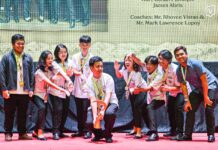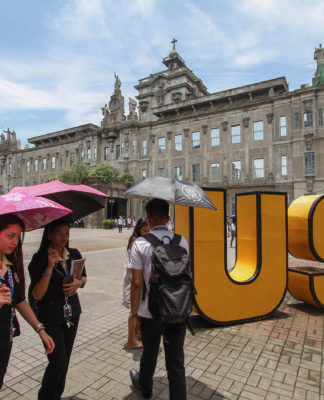CARING for the environment is an obligation, not an optional duty for Catholics.
Nearly a year since the release of “Laudato si’,” Pope Francis’ encyclical on taking care of creation, the Thomasian community was urged to safeguard the “common home” in the “Ambag Kalikasan” retreat-conference last April 5 to 7.
Fr. John Leydon, Philippine co-convenor of the 2014 Global Catholic Climate Movement, said taking care of the environment should be prioritized by every Catholic.
“Living our vocation to be protectors of God’s handiworks is essential to a life of virtue, not an optional or a secondary aspect of our Christian experience,” Fr. Leydon said.
Fr. Leydon reiterated Laudato si’s call to the faithful to start cultural change through “profound interior conversion” to eradicate “ecological crises” mainly caused by irresponsible use of technology.
“Ecological crisis is not a Catholic crisis, it’s a human species crisis. The root cause is our modern culture, which [the Pope] characterizes as the technocratic paradigm,” Fr. Leydon said in his keynote address.
Fr. Benny Tuazon, executive director of the Ministry of Ecology of the Archdiocese of Manila, said the Pope’s encyclical correlates the environment’s importance with the principles of Christian faith.
“Using the present crisis, the Pope presented how Christians regard creation. Ultimately, the goal of the encyclical is not only for all to care for the Earth for our own survival, but also for our own salvation,” Fr. Tuazon told the Varsitarian.
The retreat-conference was the University’s contribution to the Catholic Bishops’ Conference of the Philippines (CBCP) call for “integral faith renewal” in preparation for the 500th year of the arrival of Christianity in the Philippines in 2021.
Thomasian response
Vice Rector for Religious Affairs Fr. Filemon de la Cruz, Jr., O.P., urged the Thomasian community to lead and actively participate in ecological affairs to preserve the “common home.”
“As a Catholic University, we are not only called as an institution. We are gathered as a community of Christ. In Laudato si’, you can see the richness of our faith tradition at work in addressing the concerns of our common home,” Fr. de la Cruz said.
Fr. Rolando Castro, O.P., head of the Priory of St. Thomas Aquinas, the Dominican community in UST, said the modern generation is blinded by worldly things, reminding Thomasians of the Creator’s promises of an “eternity with Him.”
The retreat-conference also highlighted the Thomasian’s “output-based contribution” to taking care of the environment.
Engineering alumnus Rikki Macolor presented his invention, the solar lamp, which lighted 1,300 houses after the devastation caused by Typhoon “Yolanda” in 2013. Macolor was among the young people who delivered testimonies during the youth encounter with Pope Francis at UST in January 2015.
“You have a lot of Filipinos who have talents, but the problem is they do not have enough knowledge to do such,” Macolor said. “I think awareness should be the first step to actually do something.”
Other Thomasians recognized were Antonio Espejo of the UST Facilities Management Office, who talked about the UST Sewage Treatment Plant, and Chemical Engineering senior Ralph Dequiña, who presented his “Green Hope” project, primarily powered by renewable energy.
Leo-Martin Angelo Ocampo, a faculty member from the Institute of Religion, translated Laudato si’ into Filipino, to help the laity understand the Pope’s message.
“If a document as important as Laudato si’ becomes translated into Filipino, then it becomes accessible to more people, especially to simple folk. Mas tumatagos sa puso,” Ocampo said in an interview.
With the permission of the Libreria Editrice Vaticana, the official publisher of the Vatican, he started the translation of Laudato si’ in June last year and managed to publish the Filipino version in two months.
Laudato si’ is the second encyclical of Pope Francis, which focuses on the need for people to take action amid worsening environmental problems. John Gabriel M. Agcaoili and Lea Mat P. Vicencio















